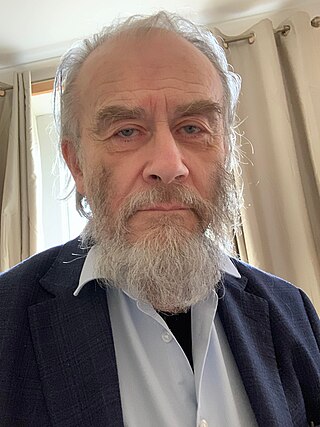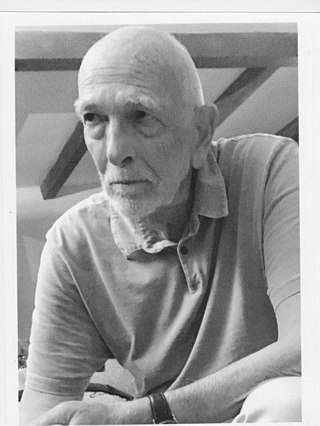Related Research Articles
Objectivism is a philosophical system named and developed by Russian-American writer and philosopher Ayn Rand. She described it as "the concept of man as a heroic being, with his own happiness as the moral purpose of his life, with productive achievement as his noblest activity, and reason as his only absolute".

Nicholas Rescher was a German-born American philosopher, polymath, and author, who was a professor of philosophy at the University of Pittsburgh from 1961. He was chairman of the Center for Philosophy of Science and chairman of the philosophy department.

Mikhail Mikhailovich Bakhtin was a Russian philosopher, literary critic and scholar who worked on literary theory, ethics, and the philosophy of language. His writings, on a variety of subjects, inspired scholars working in a number of different traditions and in disciplines as diverse as literary criticism, history, philosophy, sociology, anthropology and psychology. Although Bakhtin was active in the debates on aesthetics and literature that took place in the Soviet Union in the 1920s, his distinctive position did not become well known until he was rediscovered by Russian scholars in the 1960s.

Stanley Louis Cavell was an American philosopher. He was the Walter M. Cabot Professor of Aesthetics and the General Theory of Value at Harvard University. He worked in the fields of ethics, aesthetics, and ordinary language philosophy. As an interpreter, he produced influential works on Wittgenstein, Austin, Emerson, Thoreau, and Heidegger. His work is characterized by its conversational tone and frequent literary references.
Steven Theodore Katz is an American philosopher and scholar. He is the founding director of the Elie Wiesel Center for Judaic Studies at Boston University in Massachusetts, United States, where he holds the Alvin J. and Shirley Slater Chair in Jewish and Holocaust Studies.

Peter Guy Winch was a British philosopher known for his contributions to the philosophy of social science, Wittgenstein scholarship, ethics, and the philosophy of religion. His early book The Idea of a Social Science and its Relation to Philosophy (1958) was an attack on positivism in the social sciences, drawing on the work of R. G. Collingwood and Ludwig Wittgenstein's later philosophy.

Stephen Richard Lyster Clark is an English philosopher and professor emeritus of philosophy at the University of Liverpool. Clark specialises in the philosophy of religion and animal rights, writing from a philosophical position that might broadly be described as Christian Platonist. He is the author of twenty books, including The Moral Status of Animals (1977), The Nature of the Beast (1982), Animals and Their Moral Standing (1997), G.K. Chesterton (2006), Philosophical Futures (2011), and Ancient Mediterranean Philosophy (2012), as well as 77 scholarly articles, and chapters in another 109 books. He is a former editor-in-chief of the Journal of Applied Philosophy (1990–2001).

Avishai Margalit is an Israeli professor emeritus in philosophy at the Hebrew University of Jerusalem. From 2006 to 2011, he served as the George F. Kennan Professor at the Institute for Advanced Study in Princeton.
Stephen David Ross is an American philosopher, currently Distinguished Research Professor of Philosophy, Interpretation, and Culture and of Comparative Literature at Binghamton University. He has published over 30 books in interdisciplinary philosophy, especially on art, literature, ethics, and metaphysics, from American pragmatism through poststructuralism, from human beings to animals and things.
The study and teaching of philosophy in Canada date from the time of New France. Generally, Canadian philosophers have not developed unique forms of philosophical thought; rather, Canadian philosophers have reflected particular views of established European and later American schools of philosophical thought, be it Thomism, Objective Idealism, or Scottish Common Sense Realism. Since the mid-twentieth century the depth and scope of philosophical activity in Canada has increased dramatically. This article focuses on the evolution of epistemology, logic, the philosophy of mind, metaphysics, ethics and metaethics, and continental philosophy in Canada.
John L. Pollock (1940–2009) was an American philosopher known for influential work in epistemology, philosophical logic, cognitive science, and artificial intelligence.
Lawrence Lee Langer was an American scholar, Holocaust analyst, and professor of English and Holocaust education.
Anthony Dirk Moses is an Australian scholar who researches various aspects of genocide. In 2022 he became the Anne and Bernard Spitzer Professor of Political Science at the City College of New York, after having been the Frank Porter Graham Distinguished Professor of Global Human Rights History at the University of North Carolina at Chapel Hill. He is a leading scholar of genocide, especially in colonial contexts, as well as of the political development of the concept itself. He is known for coining the term racial century in reference to the period 1850–1950. He is editor-in-chief of the Journal of Genocide Research.
Zachary Braiterman is an American philosopher, best known for writing on the topics of Holocaust theology, Jewish thought, aesthetics, and Jewish art. He is also a professor of religion at Syracuse University.

Herbert Morris was an American philosopher, legal scholar, and literary critic, who spent his career at the University of California, Los Angeles.
Gordon Graham (1949) is Chair of the Edinburgh Sacred Arts Foundation, Emeritus Professor of Philosophy and the Arts at Princeton Theological Seminary in the USA, and a Fellow of the Royal Society of Edinburgh, Scotland's premier academy of science and letters.
Larry May is an American philosopher and author. He is W. Alton Jones Professor of Philosophy at Vanderbilt University and the author of several books. His theory of international law has been described as "neo-Grotian".
Roger S. Gottlieb is professor of philosophy and Paris Fletcher Distinguished Professor in the Humanities at Worcester Polytechnic Institute. He has written and edited 21 books, including two Nautilus Book Awards winners, and over 150 papers on philosophy, political theory, environmental ethics, religious studies, religious environmentalism, religious life, contemporary spirituality, the Holocaust, and disability. He is internationally known for his work as a leading analyst and exponent of religious environmentalism, for his passionate and moving account of spirituality in an age of environmental crisis, and for his innovative and humane description of the role of religion in a democratic society.